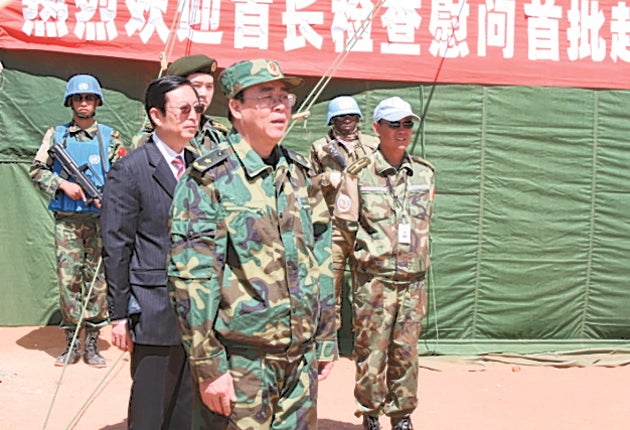Chinese bullets killed our staff in Darfur, says UN

Your support helps us to tell the story
From reproductive rights to climate change to Big Tech, The Independent is on the ground when the story is developing. Whether it's investigating the financials of Elon Musk's pro-Trump PAC or producing our latest documentary, 'The A Word', which shines a light on the American women fighting for reproductive rights, we know how important it is to parse out the facts from the messaging.
At such a critical moment in US history, we need reporters on the ground. Your donation allows us to keep sending journalists to speak to both sides of the story.
The Independent is trusted by Americans across the entire political spectrum. And unlike many other quality news outlets, we choose not to lock Americans out of our reporting and analysis with paywalls. We believe quality journalism should be available to everyone, paid for by those who can afford it.
Your support makes all the difference.China is trying to block a United Nations report which says that more than a dozen types of Chinese bullet have been used against peacekeepers in Darfur. The UN says 300,000 people have died and at least 2.6 million driven from their homes since ethnic tensions erupted in the province of western Sudan in 2003.
The Sudanese government puts the death toll at about 10,000 people, but it has been accused of using militia known as the janjaweed, which have been blamed for much of the conflict's atrocities, despite official denials.
At issue is whether China has supplied the bullets for the atrocities. The unpublished report alleges that casings from Chinese manufacturers were found at the site of attacks against peacekeepers from the UN and the African Union. Other casings came from Israel or Sudan itself.
Chinese weapons are widely available on the international market and the report does not make direct allegations that the country has breached rules on selling weapons to the Sudanese for use in Darfur.
But China is keen to prevent the report's publication, calling it an "irresponsible attack". Foreign Ministry spokesman Ma Zhaoxu said the report was "based on unconfirmed information and made irresponsible accusations". He went on: "This is inappropriate. We urge the specialist team to abide by the principles of being objective and responsible in carrying out its work."
Unanimous consent of the 15 members of the UN Security Council committee – which monitors the 2005 arms embargo – is needed before the committee can release the report on the conflict in Darfur.
Numerous ceasefires and peace deals have failed to end the conflict in the volatile region and China has delayed or blocked a number of proposals aimed at halting the fighting.
China buys two-thirds of Sudan's oil and Western governments and human rights campaigners have accused Beijing of indirectly supporting genocide by rejecting UN forces without Khartoum's agreement.
As a permanent member of the UN Security Council, China also holds a veto over UN resolutions and has been urged to do more with its influence to resolve the situation in Darfur.
Over the years it has refused to back either a joint UN and African Union peacekeeping mission or sanctions on Sudanese military and militia leaders accused of committing crimes against humanity. When the sanctions were introduced in 2006, China abstained.
Sudan President Omar al-Bashir is wanted by the International Criminal Court on war crimes charges. While it is not technically illegal to supply weapons to Sudan, countries have to get guarantees from its government that the arms will not end up being used in Darfur.
Committee chairman Ambassador Thomas Mayr-Harting of Austria said: "One delegation made it very clear it has problems with the substance of the report."
However, Beijing has sought to avoid being seen to put too much pressure on the Sudanese, warning it could be counterproductive. Although China is an ally of some of the world's most controversial regimes, like North Korea and Burma, its stated policy is of non-intervention in other countries' affairs.
Join our commenting forum
Join thought-provoking conversations, follow other Independent readers and see their replies
Comments